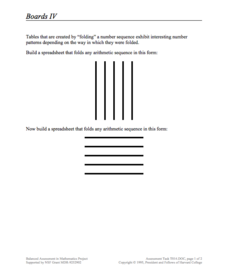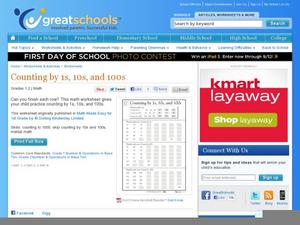Curated OER
Counting by 3s, 4s, and 5s
Can learners recognize the pattern in these number sequences? Here's a hint: it's skip counting by either three, four, or five. There are three examples at the top demonstrating each of these, and scholars complete 15 number sequences to...
Curated OER
Missing Numbers to Twenty
Which number is missing? Beginning counters examine twenty-six number sequences, one for each letter of the alphabet. Each sequence has four numbers, ranging from one to 20. There is one number missing from the sequence, and learners...
Curated OER
Frogs Hopping by 2s
Hop to it! Beginning counters fill in water lily number sequences as a frog "hops" across them, skip counting by twos. There are five sequences in total, and some require counting backward. Learners can reference the two examples, which...
Curated OER
Joining Sentences
Sentence combining meets multiple objectives for writers, and they are all available in this informational text exercise. Learners read a mixed-up excerpt about the history of chess, putting 15 sentences into logical order. Have a...
Curated OER
Identifying Text Structure
Work on identifying text structure with this thorough learning exercise. After studying a diagram depicting six different text structures (compare/contrast, spatial, chronological, problem and solution, cause and effect, and order of...
Curated OER
Hopping by 2s
Hop to it! Young counters practice skip counting by two using illustrations of animals hopping from place to place. Each image shows a number sequence and scholars draw in the path as they move from number to number. Encourage them to...
Curated OER
Counting Out Loud
These number sequences are quite fun to look at! Beginning counters complete six of them as they say and write in the numbers. They count only by 1s, however some of these move from greatest to least. The highest number here is 20. Once...
Curated OER
Worksheet 5 1/2: Sequence
In this sequence learning exercise, students compute sequence problems. They calculate problems dealing with the age of the universe, estimate population, time and rate. This one-page learning exercise contains seven multi-step problems.
Curated OER
Number Chart 13: Skip Counting by 9
In this skip counting instructional activity, 4th graders fill in the numbers to complete a pattern of skip counting by 9. Students begin with the number 5 and write the numbers as they skip count to 500.
Curated OER
The Sequences Problem
In this Algebra I/Geometry/Algebra II worksheet, students determine what term is missing in the two given sequences. The one page worksheet has two problems with the solutions.
Curated OER
Patterns
In this patterns learning exercise, 2nd graders look at, study, analyze and choose which pattern comes next in 5 rows of patterns. Students circle and draw their answers.
Concord Consortium
Boards IV
Build a connection between algebraic sequences and spreadsheets. Learners examine a specific folding pattern and convert the pattern into a spreadsheet. The goal of the spreadsheet is to produce a sequence of a specific pattern modeled...
Noyce Foundation
Tri-Triangles
Develop an understanding of algebraic sequences through an exploration of patterns. Five leveled problems target grade levels from elementary through high school. Each problem asks young mathematicians to recognize a geometric pattern....
Curated OER
Morning Math
Get your morning mathematicians thinking with this set of warm-ups. You can do them all in one day, or separate them and have kids do one each day. They will review past concepts and sharpen newer ones with this assortment of problems...
Curated OER
Counting by 1s, 10s, and 100s
These sequences are missing numbers and require some skip counting to complete. Scholars finish rows of numbers first counting by 1s, then 10s, and finally 100s. Each has three given numbers to get them started, and they fill in five...
Curated OER
Complete the Patterns
In this patterns worksheet, learners analyze the geometric shapes in each of 5 rows. Students determine the pattern and then draw the next three shapes that would continue the sequence.
Curated OER
Complete the Patterns
In this patterns instructional activity, students analyze a row of geometric shapes in a pattern. Students draw the next three shapes that would come in the sequence. There are 5 problems.
Curated OER
Understanding Sequence
In this sequencing instructional activity, students read a story and number the events in the story. Students number 6 events from the story and put them in order from first to last.
Math Stars
Math Stars: A Problem-Solving Newsletter Grade 6
Think, question, brainstorm, and make your way through a newsletter full of puzzles and word problems. The resource includes 10 different newsletters, all with interesting problems, to give class members an out-of-the box math experience.
Curated OER
Find a Pattern problem solving 6.6
In this finding a pattern using a table worksheet, students write what they know and need to find out, make a table to show a pattern, and solve the pattern sequence. Students write nine answers.
Curated OER
A Piece of Pi
In this piece of Pi worksheet, students examine pi. They count how many times a given digit appears in the list of digits. Students describe their observations and conclusions regarding pi. This one-page worksheet contains 6...
Curated OER
Exploring Infinite Sequences, Part II
In this algebra worksheet, students identify the nth term of the sequence. They find the missing term in the pattern and what theorem justifies their choice. There are 12 questions.
Curated OER
Counting Sequences
In this counting sequence worksheet, students fill in missing numbers in a series of 8 number patterns. Patterns appear in sets of boxes in rows.
Curated OER
Learning about Fibonacci
In this learning about Fibonacci worksheet, students read about Leonardo Fibonacci and his contribution to mathematics, then study the pattern of Fibonacci numbers, in math and in nature.

























